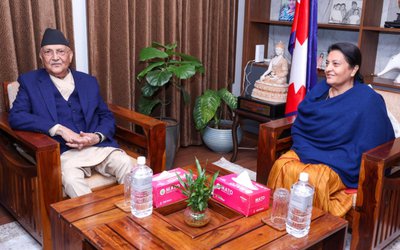More on National






As climate change is affecting the rainfall pattern, it is likely to affect the overall productivity of a country like Nepal. Giving high priority to the issue of climate change, the 36th World Food Day (WFD) was observed with the theme “Climate is changing. Food and agriculture must too.”
High level officials and staff from National Planning Commission, Ministry of Agricultural Development, and Ministry of Livestock Development, representatives from non-government organizations, cooperatives and outstanding farmers from various parts of the country attended the major program organized in Kathmandu.
Amidst the main ceremony, Minister for Agricultural Development Gauri Shankar Chaudhary and Minister of State for Agricultural Development Radhika Tamang distributed prizes and certificates of appreciation to 104 outstanding farmers, farmers’ organizations, and agri-entrepreneurs for their outstanding results achieved in the area of agriculture, livestock and fishery.
Speaking on the occasion, Minister Chaudhary highlighted the need to bring about changes in agricultural sectors of Nepal to produce more by adopting modern and resilient production technologies in order to adapt to adverse effects of climate change.
Minister of State Tamang said that Nepal should move forward to achieve self-reliance in food.
Member of National Planning Commission (NPC) Dr. Prabhu Budhathoki expressed that the real problems faced by the farmers should be the center of agricultural development plans and programs and assured the farmers that the NPC would keep its doors open to the farmers to come up with new ideas to be incorporated in the planning process.
The country representative of Food and Agriculture Organization (FAO) Dr. Somsak Pipoppinyo referred the 36th WFD -2016 message of FAO Director-General José Graziano da Silva highlighting that erratic weather patterns and the increase of pest and disease outbreaks were affecting agricultural productivity and therefore undermining efforts to end hunger and all other forms of malnutrition by 2030.
The message also stressed on collective actions with a recognition that agricultural sectors can play a transformative role in addressing the impacts of climate change. The message further stated that by working together, we can seize the transformative potential of the agricultural sectors
Dr. Pipoppinyo, drawing on the theme of the World Food Day and DGs’ WFD messages, further emphasized that Nepal is one of the vulnerable countries to climate change and related disasters that are already impacting on the performance of agriculture sector. He pointed out that climate change has become a cross cutting theme in FAOs’ strategic framework and accordingly, the climate change adaptation and disaster risk reduction are the core of FAO’s work in Nepal.
Underlining another topic, which is much relevant and related to the theme of WFD and issues related to food security and nutrition, Dr. Pipoppinyo said that the 68th UN General Assembly declared 2016 as the International Year of Pulses (IYP) that aims to heighten public awareness of the nutritional benefits of pulses as part of sustainable food production aimed towards food security and nutrition.
Secretary at the Ministry of Agricultural Development Uday Chandra Thakur, Acting Secretary at Ministry of Livestock Development Shyam Prasad Poudel and Member-Secretary of the World Food Day Committee Renu Adhikari also addressed the ceremonial function chaired by Dr.Yubak Dhwaj GC, the Director-General of the Department of the Agriculture.
The 36th WFD -2016 message of Minister Chaudhari was broadcast by the state-owned Radio Nepal on 16 October. The World Food Day Committee organized a press conference on 24 October 2016 which was addressed by Dr.Yubak Dhwaj GC, the Director General of the Department of the Agriculture and Dr. Binod Saha, Assistant FAO Representative.
The observance of the 36th WFD-2016 was continued at the district level. Promotional materials were distributed throughout 75 districts of Nepal under the coordination of District Agriculture Development Offices (DADO). “Secondary school level essay competitions are also organized in all the districts. As part of the program, DADOs are also organizing ceremonial functions in the districts headquarters followed by colorful walkathons and rallies,” stated a press release issued by FAO.









